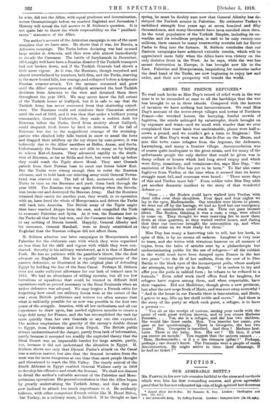AMONG THE FRENCH REFUGEES.*
To read suoh books as Miss Day's record of relief work in the war zone is to be reconciled at once to all the hardships that the war has brought to us in these islands. Compared with the horrors of invasion we have nothing but inconveniences. We read Miss Day's account of the terror-swept villages and towns of Northern France—the wrecked homes, the hurrying, fearful crowds of fugitives, the minds unhinged by catastrophe, death brought on by exposure and want—and we recall with wonder that we ever complained that roast lamb was unobtainable, plums were half-a- crown a pound, and we couldn't get a train to Brighton I The centre of Miss Day's work was at Bar.le-Duo on the Meuse, and into this -town came refugees from the Argonne, the Ardennes, Luxemburg, and many a frontier village. Accommodation was of course quite inadequate to the great strain, and for many of the unfortunate people the only shelter that could be given was in damp cellars or houses whioh had long stood empty and which were dirty, insanitary, and verminoue—f or, says Miss Day, "the sanitation. of Bar.le-Duc has yet to be born." To Bar also came fugitives from Verdun at the time when it seemed that its heroics struggle must fail, and murmurs were heard : "Three more days of this and Verdun must fall." From soldier tales Miss Day adds yet another dramatic incident to the story of that wonderful defence ;— "Once . . . the Boohes could have walked into Verdun with their rifles over their • shoulders, Four days and four nights we lay in the open Mademoiselle. Our trenches were blown to pieces, we were cut off by the barrage, we had no food but our emergency rations, no ammunition could reach us. Then our guns became silent. The Boohes, thinking it was a ruse, a trap, were afraid to come on. They thought we were reserving fire to mow them down at close quarters, so they waited twelve hours, and during that time our eamions brought the ammunition up, and when they did come on we were ready for them."
Miss Day has many a harrowing tale to tell, but her book, in spite of this, is by no means all sadness. Laughter is very near to tears, and she writes with vivacious humour on all manner of topics, from the bales of articles sent by a philanthropic but undiscriminating public for the use of refugees—" all the rubbish in the world must have been dumped upon France in the last two years "—to the fit of her uniform, from the cow of le Pere Batthi to the black eyes of the inconsequent psilu, whose analysis she attempts, but gives up in despair. "It is useless to try and offer you the poilu in tabloid form ; he refuses to be reduced to a formula." Even relief work itself offers feed for laughter, for refugees have rogues among them, and when respectable, have their vagaries. Did not Madeleine, though given a new petticoat, lust after the new serge frock of Marie, and was sent away sorrowful ? "And in the house in rue Paradis-there is lamentation, and Marie, I grieve to say, lifts up her shrill treble and crows." And there is the story of the party at which each guest, a refugee, is to have a present :—
'You sit at the receipt of custom, issuing- your cardswith the name of each guest written thereon, and to you comes Madame Ponnain. . . . Yes, she is a refugee, and, she has two children., She would like three cards. Bon. You inscribe her name, you gaze at her questioningly. 'There is Georgette, she has two years.' Bon. Georgette is inscribed, And then ? Madame hesi- tates. There is the baby. Bon. His are ? 'Eh bleu-, il n'est pas encore au monde.' You suggest that.the unborn cannot . . .
Mats, Mademoiselle ; si ii y a des otrennee (gifts) ? ' Perhaps, perhaps ; one doesn't know. The Ponnains were a people of much discrimination, /le might arrive in time. Quel dommage, if he had no ticket ? "


































 Previous page
Previous page